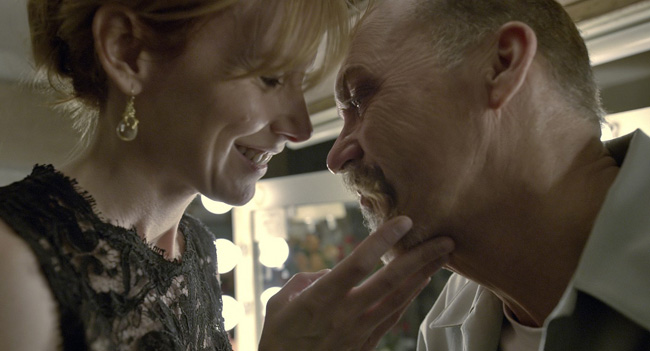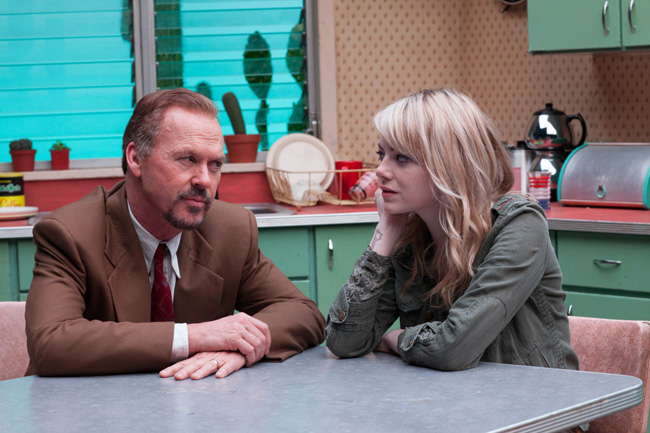
Written by Alejandro González Iñárritu, Nicolás Giacobone, Alexander Dinelaris and Armando Bo
Directed by Alejandro González Iñárritu
USA, 2014
His use of natural lighting, the gorgeous compositions he creates often on the fly, those long takes. This is what we talk about when we talk about Emmanuel Lubezki, the Mexican cinematographer responsible for such arresting imagery in the films of Terrence Malick (The New World, The Tree of Life, To the Wonder), Alfonso Cuarón (Children of Men, Y tu mamá también, Gravity), the Brothers Coen (Burn After Reading), and Alejandro González Iñárritu (“Anna”, a short in the anthology To Each His Own Cinema). He is the only cinematographer in recent memory, possibly next to Roger Deakins, that pushes the form to its limits and has name recognition for such. The naturalistic beauty of The Tree of Life was nothing compared to the – wait for it – physics-defying work in Gravity. And here he is again, using a simulated long take for Iñárritu’s Birdman. “But isn’t it just a gimmick?”, you might ask. Well, yes. And that’s probably the point.
It’s less pleasant to justify such an audacious gimmick with “we experience life in one long take” and more interesting to consider the fact that the film is about ego, a thing that continually inflates and deflates in several characters. We would like to think our life is in one take, especially the likes of faded star and former big screen superhero Riggan Thomson (Michael Keaton), as he mounts a substantial passion/vanity project in the form of a Broadway adaptation of Raymond Carver’s What We Talk About When We Talk About Love, which he has adapted, chosen to star in, and directed himself. As we follow around characters, and mostly him, it makes everything complicated in an enjoyably masochistic way. At once, Riggan can’t handle this pressure of trying to prove himself to the world that he’s a Serious Man, while simultaneously having to balance the backstage drama of an equally egocentric actor (Edward Norton), his fresh out of rehab daughter (Emma Stone), his girlfriend-cum-co-star (Andreas Riseborough), a critic with a venomous pen (Lindsay Duncan), an actress whose search for validation is pretty consumptive (Naomi Watts), his stressed producer and best friend (Zach Galifianakis), and his disappointed ex-wife (Amy Ryan), but at the same time he needs all these disparate threads and complications to make his life, essentially, worth living.
So, it’s not only Riggan that would want to see his life complicated by many threads paired with this one shot method of storytelling, it’s everyone else. It doesn’t ever invalidate their desires, and while the cinematography does seem to call attention to itself, so do the players, purposefully. The meta-textual casting of Keaton as “Birdman” is self-aware, and sending up his persona warrants this hyper-technical methodology. It’s a strange form of narrativising the final days before his play has its opening night, all in one breath. (Ironically, the film may or may not have you gasping for breath.) And not unlike Iñárritu’s previous films like Babel and 21 Grams, Birdman still occupies itself as a piece of hyperlink cinema. It’s in that way that the cinematography is most interesting.
In hyperlink cinema, we’re given a number of characters whose trajectories we want to trace and follow, and each thread leads essentially to the same end point: in short, everyone is connected in one way or another. While it’s obvious that people working on the same production are going to be connected, it’s what those connections are which is interesting. Without cutting or making it overt that the film is going to jump from one storyline to another, Iñárritu impressively is able to survey his entire ensemble and give them their own goals, objectives and obstacles. They’re hilarious. It’s fun and intoxicating. It’s actually more akin to Robert Altman in its panoramic view of “Behind the Scenes of What We Talk About When We Talk About Love”. They’re all distinctive people, searching for the same thing.
It’s what they’re searching for that seems mildly troublesome, at least in its approach. Choosing Carver’s short story is an obvious piece of projection for Riggan (and Iñárritu), and while the tempestuous journey to feeling validated is not in itself a bad thing, it feels a little reductive and cynical in the film. There’s a vaguely dialectical feel to the film when it discusses not persona or even the meaning of life, but culture. Emma Stone’s daughter character, Sam, makes it clear that celebrity and “mattering” have reached an apex of transience in the current culture, where “virality” is not forever. With that kind of ideology, Birdman feels like a comeback film that’s disdainful towards comebacks, or even fame in general. That cynicism isn’t unwarranted necessarily, but it spends so much time (using its magical realism and camera trickery) trying to prove a kind of sincerity and authenticity about its protagonist. Sure, Riggan may be an insufferable narcissist, but he has feelings to. And we sympathize with him for the bulk of the film. That is, until the film starts sneering in our faces.
Cynical showbiz films aren’t new, but there’s an impression that if they’re going to be cynical, it should be upfront. The Player, The Bad and the Beautiful, and even 8 ½ are all able to balance sincerity and cynicism in a digestible way. They’re more often cynical about the culture than the person. But Birdman, or the Unexpected Virtue of Ignorance blurs that line of contempt a little too much to a point where it’s hard to tell how the film actually feels about Riggan. Magisterial in its technical form, sure (Lubezski’s cinematography straddles the line between transcendent and distracting), but I think Iñárritu might have some delusions of grandeur.
– Kyle Turner
Visit the official website of the New York Film Festival.



